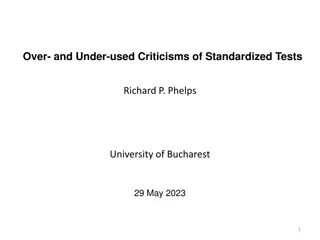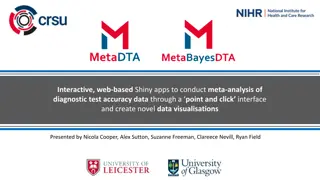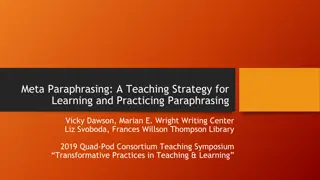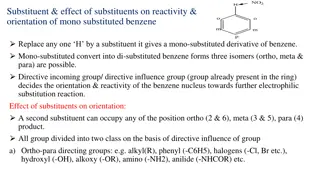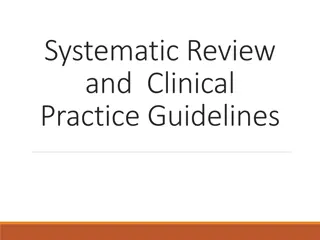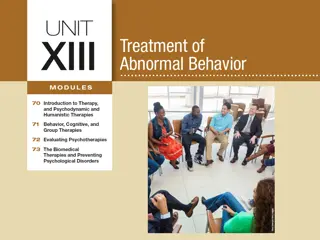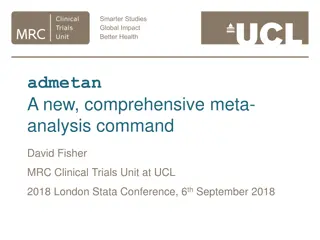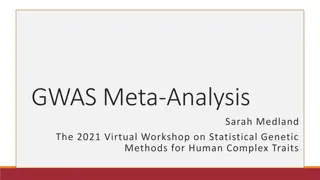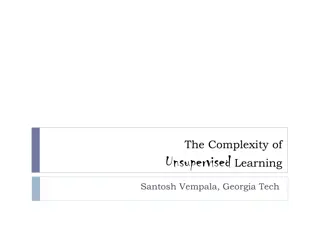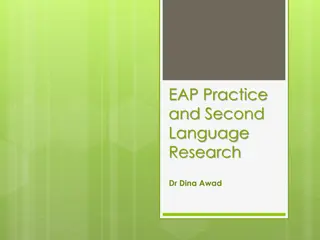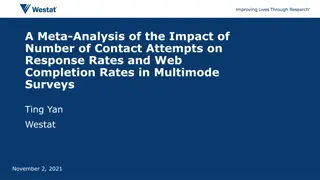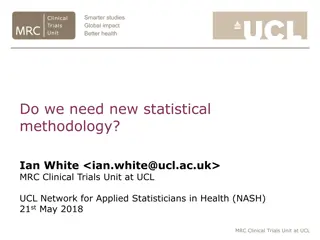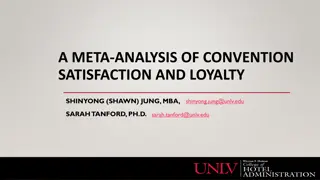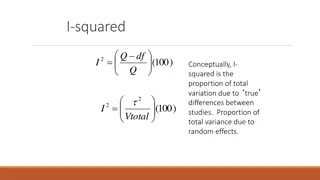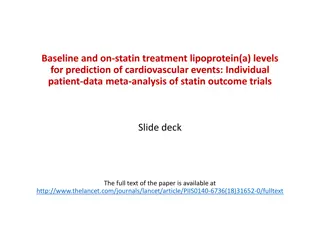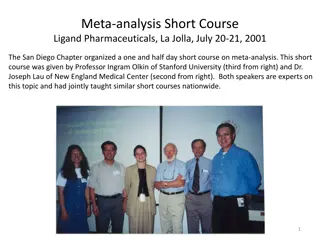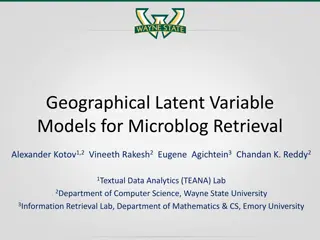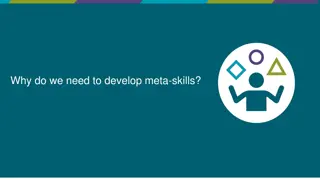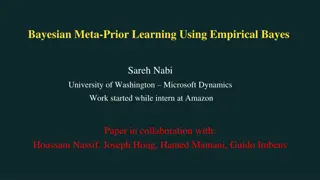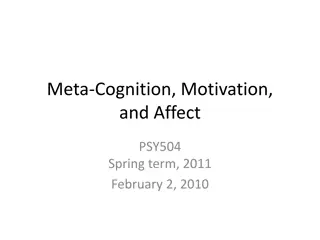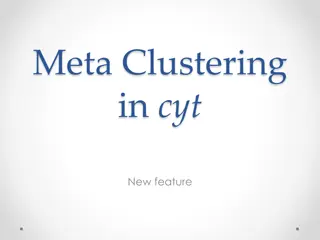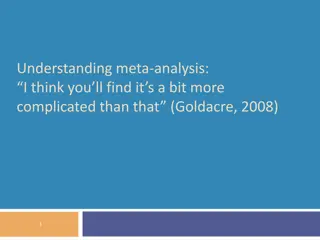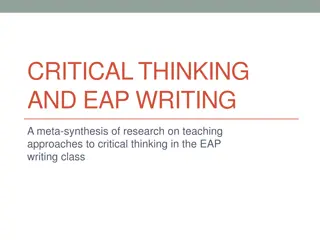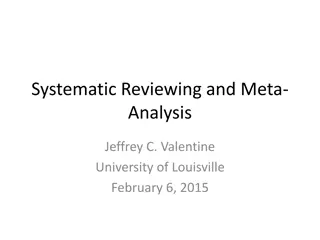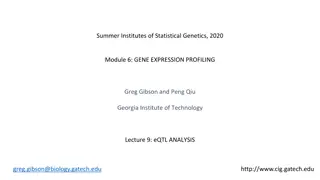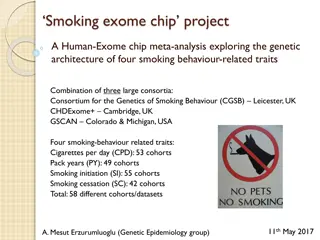Introduction to Meta-analysis in Stata
This workshop, presented by Dr. Christine R. Wells from UCLA, provides an in-depth exploration of meta-analysis in Stata. Participants will learn about systematic reviews, data collection and organization, running meta-analyses, interpreting results, creating graphs, and identifying biases. The focu
2 views • 181 slides
Insights on Standardized Test Criticisms and Testing Effects
This presentation discusses both overused and underused criticisms of standardized tests, highlighting issues such as time lost from learning, narrowing of the curriculum, and the testing effect on student learning. It delves into the benefits of testing and presents findings on the impact of testin
1 views • 48 slides
Interactive Web-Based Shiny Apps for Meta-Analysis of Diagnostic Test Accuracy
Explore interactive Shiny apps presented by Nicola Cooper and team for conducting meta-analysis of diagnostic test accuracy data with a point-and-click interface. Find educational primers, principles, and tools to enhance evidence synthesis methods and visualization in healthcare.
2 views • 22 slides
Meta Paraphrasing: A Teaching Strategy for Learning and Practicing Paraphrasing
Paraphrasing is a vital skill that demonstrates understanding, allows integration of ideas ethically, and enhances credibility. This strategy involves proper analysis, using one's words, and citing sources accurately to avoid plagiarism.
5 views • 18 slides
Substituent Effects on Benzene Reactivity and Orientation
Substituents in benzene derivatives influence reactivity and orientation in electrophilic substitution reactions. They can be classified as ortho-para directing or meta directing based on their effect. Ortho-para directing groups increase electron density and activate the ring, while meta directing
7 views • 14 slides
Introduction to Three-Level Meta-Analysis Models in R: A Practical Example
Explore three-level meta-analysis models in R with a focus on the association between paternal anxiety and child emotional problems. Learn to prepare data files, fit models using the rma.mv function in metafor, and understand the structure of the formula for random effects. Follow along with a step-
7 views • 22 slides
Understanding Systematic Reviews, Meta-analysis, and Clinical Practice Guidelines
Explore the importance of systematic reviews, critical appraisal questions, meta-analysis, and clinical practice guidelines in the healthcare field. Learn about the process of appraising systematic reviews, the significance of meta-analysis, and the benefits of following clinical practice guidelines
1 views • 16 slides
Evaluating the Effectiveness of Psychotherapy: Evidence and Critiques
Evidence suggests that psychotherapy works for many individuals, with high satisfaction rates reported. Critics, however, raise concerns about placebo effects, therapist biases, and human biases influencing perceptions of success. Clinicians acknowledge successful cases but remain cautious of cognit
0 views • 36 slides
Exploring Meta-Ethics: Understanding Ethical Principles
Meta-ethics delves into the nature and validity of ethical statements, examining the meaning of right and wrong and the basis for moral claims. It explores distinctions between descriptive and normative ethics, cognitive and non-cognitive perspectives, and various ethical approaches such as naturali
0 views • 34 slides
Comprehensive Overview of Admetan: A New Meta-Analysis Command
This meta-analysis command, Admetan, introduced by David Fisher from MRC Clinical Trials Unit at UCL, offers a comprehensive analysis of combining results from independent studies. It builds on the history of meta-analysis in Stata and aims to enhance capabilities for researchers. Admetan provides f
1 views • 19 slides
Meta-Analysis in GWAS: Methods and Applications
Meta-analysis in GWAS involves combining data across studies to estimate overall effects, explore cohort differences, improve power, and replicate findings. It includes joint vs. meta-analysis, methods, and types such as fixed effect and random effect meta-analyses.
0 views • 20 slides
Meta-Evaluation of Private Sector Interventions in Agribusiness: Impacts and Methodologies
This meta-evaluation study explores the impact of access to finance and farmer/business training interventions on agribusiness indicators. It discusses the methodologies used in evaluations, highlighting the use of randomized control trials and quasi-experimental methods. Findings provide insights i
0 views • 25 slides
Meta's Role in Amplifying Anti-Rohingya Hate on Facebook
The investigation findings reveal Meta's failure to address hate speech and incitement against the Rohingya people on Facebook, resulting in a platform that amplified and promoted harmful content. Despite admitting in 2018 that more needed to be done, Meta's business model of data collection and eng
4 views • 7 slides
Unsupervised Learning: Complexity and Challenges
Explore the complexities and challenges of unsupervised learning, diving into approaches like clustering and model fitting. Discover meta-algorithms like PCA, k-means, and EM, and delve into mixture models, independent component analysis, and more. Uncover the excitement of machine learning for the
0 views • 71 slides
Understanding Workcodes in Texas Transportation Engineering
Explore the concept of Workcodes (WC) in the Texas Department of Transportation (TxDOT) engineering framework, which serves as the Texas version of Crash Modification Factors (CMFs). Learn about WC categories, methodology for updating WC, quality checks, pre-selection processes, and examples of WC t
0 views • 21 slides
Insights into Second Language Learning Research
This presentation delves into various aspects of second language learning research, including the use of dictionaries, part-of-speech explanation, grammatical rules, and bilingual dictionary use. Studies show mixed results on the effectiveness of meta-analysis in form-focused instruction and the imp
0 views • 26 slides
Impact of Number of Contact Attempts on Response Rates in Multimode Surveys
This meta-analysis investigates the effects of the number of contact attempts on response rates and web completion rates in multimode surveys. Benefits of multimode surveys include improving coverage, increasing response rates, reducing costs, and enhancing measurement accuracy by utilizing multiple
0 views • 27 slides
Meta-programming in Haskell: A Closer Look at Splices and Quotations
Explore the world of meta-programming in Haskell through splices and quotations. Learn about successful extensions introduced by Simon Peyton Jones and Tim Sheard, including practical examples like generating source code using splices that are type-checked and compiled at compile time. Dive into con
0 views • 45 slides
The Need for New Statistical Methodology in Health Studies
The discussion centers around the necessity for advancements in statistical methodology, particularly in trials, observational studies, and meta-analysis. The role of statisticians in interpreting data, designing studies, and addressing missing data is highlighted. The importance of understanding ex
0 views • 19 slides
Meta-Analysis of Convention Satisfaction and Loyalty Trends
This meta-analysis explores the relationship between attributes, perceptions, satisfaction, and loyalty in the convention industry. It highlights key findings from multiple studies using statistical methods to analyze attendee satisfaction and loyalty factors. The study emphasizes the importance of
0 views • 11 slides
Exploring Funnel Plots in Meta-analysis with Metafor in R
Funnel plots in meta-analysis help assess distribution symmetry, heterogeneity, and publication bias. The trim and fill analysis with Metafor in R examines data transformations, imputes missing values, and performs sensitivity analysis through re-computing funnel plots.
0 views • 4 slides
Understanding Prediction and Confidence Intervals in Meta-Analysis
Conceptually, I-squared represents the proportion of total variation due to true differences between studies, while Proportion of total variance is due to random effects. Prediction intervals provide a range where study outcomes are expected, unlike confidence intervals which contain the parameter's
0 views • 26 slides
The Statistical Association Between Substance Misuse and Criminal Behavior
This brief synthesis discusses the statistical association between substance misuse (specifically drugs and alcohol) and criminal behavior. It draws upon meta-analyses investigating the links between drug use and crime, as well as alcohol consumption and violent behavior. Various theories are explor
0 views • 12 slides
Long-term Dual Antiplatelet Therapy for Prevention of Cardiovascular Events
Collaborative meta-analysis explores the efficacy of long-term dual antiplatelet therapy in preventing cardiovascular events in patients with previous myocardial infarction. Trials show heterogeneous results on the benefits and safety of prolonged therapy, with varying recommendations based on patie
0 views • 21 slides
Exploring the Future Role of State Governance through Meta-Governance and Political Leadership
Governance research perspective discusses the evolving role of the state in mobilizing public and private actors through interactive forms of governance. Meta-governance theory emphasizes the governance of governance, with a focus on interactive governance arenas. Recent theories of political leader
0 views • 11 slides
Interactive Microbiome Data Analysis with Parallel-Meta Suite
Conduct interactive and rapid microbiome data analysis on various platforms using Parallel-Meta Suite. This software, developed by a team from Qingdao University, simplifies the process from installation to verification. Utilize the step-by-step guide to download, install, and verify the software to
0 views • 13 slides
Development Psychology Review Questions and Studies
Explore important concepts in development psychology through a series of review questions covering sources of change, significant events, genetic and environmental studies, bio-ecological models, research methodologies, and statistical analysis used in meta-analysis.
0 views • 9 slides
Baseline Lipoprotein(a) Levels in Statin-Treated Patients for Cardiovascular Event Prediction
Lipoprotein(a) levels play a crucial role in cardiovascular disease risk assessment, especially in patients undergoing statin therapy. This individual patient-data meta-analysis from the Lancet explores the predictive value of lipoprotein(a) levels in 29,069 patients across seven landmark statin tri
0 views • 10 slides
Understanding Contexts: A Meta-Ontological Approach
Ontologies provide a general representation of reality, but knowledge is mostly context-dependent. Analyzing different types of contexts, from linguistic to manufacturing, remains a challenge. This study aims to deepen the understanding of the ontological nature of contexts by leveraging a meta-onto
0 views • 14 slides
Statistical Events in San Diego Area (2001-2003)
Several significant statistical events took place in the San Diego area between 2001 and 2003, featuring renowned speakers and experts in the field. These events covered topics such as meta-analysis, global atmospheric changes, statistical trends, and annual statistical career days. The gatherings p
0 views • 12 slides
Geographical Latent Variable Models for Microblog Retrieval
Addressing challenges in microblog retrieval such as vocabulary mismatch and multi-faceted relevance signals. Explore opportunities in leveraging lexical and non-lexical information, including geographical meta-data. Discuss prior work on utilizing timestamps and re-tweets, while also highlighting t
0 views • 19 slides
Developing Essential Meta-Skills for Personal Growth
Enhancing meta-skills such as focusing, initiative, integrity, adapting, collaborating, leading, communicating, and feeling is crucial for personal development. These skills enable individuals to maintain concentration, make confident decisions, uphold ethical values, embrace change, build relations
0 views • 14 slides
Bayesian Meta-Prior Learning Using Empirical Bayes: A Framework for Sequential Decision Making Under Uncertainty
Explore the innovative framework proposed by Sareh Nabi at the University of Washington for Bayesian meta-prior learning using empirical Bayes. The framework aims to optimize ad layout and classification problems efficiently by decoupling learning rates of model parameters. Learn about the Multi-Arm
0 views • 27 slides
Enhancing Understanding of Meta-Cognition, Motivation, and Affect in Psychology Classes
The content discusses survey responses and feedback on a psychology class focused on meta-cognition, motivation, and affect. Students shared insights on the best and worst parts of the discussions, highlighting the importance of staying on topic. The format of lectures followed by discussions was al
0 views • 53 slides
Advanced Cluster Analysis in Cytometry: A Step-by-Step Guide
Dive into the world of advanced cluster analysis in cytometry with this detailed guide. Learn how to import data, run cluster methods, visualize clusters with heat maps, and explore meta clustering features step by step. Discover tips on choosing gates, channels, methods, and more to enhance your da
0 views • 17 slides
Understanding Meta-Analysis: A Comprehensive Overview
Meta-analysis is a technique that combines results from various studies by converting them to a common measure, typically effect size. It faces challenges due to variations in population variability, selection of studies, and sensitivity of outcome measures. Factors like age, population characterist
0 views • 12 slides
Enhancing Critical Thinking in EAP Writing: A Meta-Synthesis Study
Investigating the teaching approaches to critical thinking in EAP writing classes, this meta-synthesis research delves into the importance of critical thinking, key issues in the literature review, defining critical thinking, enhancing criticality in academic writing, and understanding critical thin
0 views • 14 slides
Understanding Systematic Reviewing and Meta-Analysis
Explore the significance of systematic reviewing and meta-analysis in research literature, including definitions, options for conducting reviews, and reasons for the shift away from narrative reviewing. Discover the essential principles and future directions of systematic review practices.
0 views • 52 slides
Understanding eQTL Analysis in Gene Expression Profiling
This module delves into Expression QTL (eQTL) analysis, which links genotype to phenotype through transcript abundance modulation. The complexity of eQTLs, including cis vs. trans regulation, clustering, and the genetic component of transcription, is explored. Meta-analyses and tools like GTEx provi
0 views • 19 slides
Genetic Architecture of Smoking Behavior Traits: Meta-Analysis Insights
Exploring the genetic basis of smoking behavior-related traits through a meta-analysis combining data from three large consortia across 58 different cohorts/datasets. The study investigates genetic variants associated with cigarettes per day, pack years, smoking initiation, and smoking cessation. Ov
0 views • 34 slides

